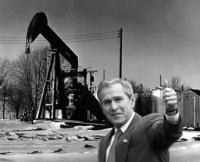Well, everyone is teeing off on Bush’s latest global warming speech–and no wonder.
I mean, it’s pretty staggering when you think about it: The campaigning George W. Bush in the year 2000 was more progressive on this increasingly pressing issue than the lame duck George W. Bush in 2008.
The major news from Bush’s speech, policy-wise, is that he said we’ll “stop the growth of U.S. greenhouse gas emissions by 2025”–or, just under two decades from now. But everybody who knows anything about this issue knows that would amount to running a completely unacceptable risk.
As Joseph Romm notes, for instance, the IPCC chair Rajendra Pachauri has stated that if we fail to take strong action before 2012 it will be “too late.”
The bulk of the president’s speech then went on to present an intellectually dishonest “either-or” argument on an issue where we really need a “both-and” approach. Throughout the speech, Bush praised technological innovation and disparaged regulatory action as a means of reducing greenhouse gas emissions.
But of course, the truth is that we need these two kinds of solutions to work together, and while the latter will assuredly have an economic impact, it can be minor and will itself help spur innovation in the private sector as companies adapt to a new emissions regime.
Honestly, the truly revealing parts of the speech were these:
Some courts are taking laws written more than 30 years ago to primarily address local and regional environmental effects, and applying them to global climate change. The Clean Air Act, the Endangered Species Act, and the National Environmental Policy Act were never meant to regulate global climate change. For example, under a Supreme Court decision last year, the Clean Air Act could be applied to regulate greenhouse gas emissions from vehicles. … Decisions with such far-reaching impact should not be left to unelected regulators and judges…”
….this year, Congress will soon be considering additional legislation that will affect global climate change. I believe that Congressional debate should be guided by certain core principles and a clear appreciation that there is a wrong way and a right way to approach reducing greenhouse gas emissions. Bad legislation would impose tremendous costs on our economy and on American families without accomplishing the important climate change goals we share.”
These passages show that Bush is reacting–albeit very intransigently–to recent events which are essentially running out of his control.
His hand has been forced. States, the courts, and Congress are all stampeding to take action on climate change precisely because the President has not.
Even Bush must now acknowledge that a sea change in public opinion is sweeping him along, even if he only does so in a ridiculously high handed way. It’s almost as if Bush should have thrown into his speech:
Some former Vice Presidents are making movies that have triggered changing public opinion on the urgency of addressing global warming. But there’s a wrong way and a right way to make a global warming movie…”
As all of this suggests, we can all but ignore Bush on climate change at this point; he has made himself less and less relevant. The real climate action is now unequivocally in Congress, where the Lieberman-Warner bill should come up soon enough. In the latest speech, Bush strongly suggests that he would veto it.
That might serve as his final folly on the climate issue–and one last misstep that will leave him still further behind, and drive Congress to pass an even tougher bill in 2009.
So…what can we say about Bush on climate that hasn’t already been said? It seems to me that only the clichés remain, persistent because they are fundamentally accurate:
He is trying to run out the clock.
He is stubborn, inflexible, apparently unable to change his mind or admit error.
He is arrogant, out of touch. He is in a bubble.
He will be badly remembered by history.
Subscribe to our newsletter
Stay up to date with DeSmog news and alerts






